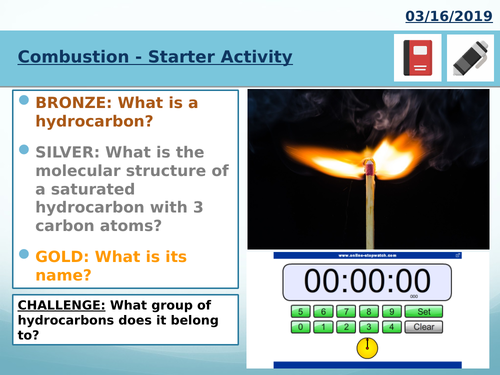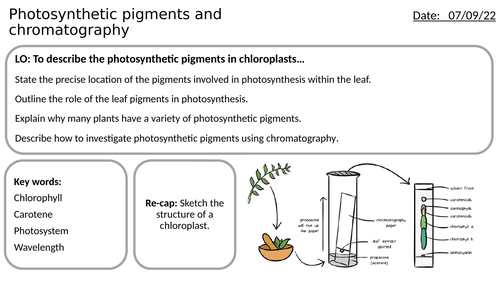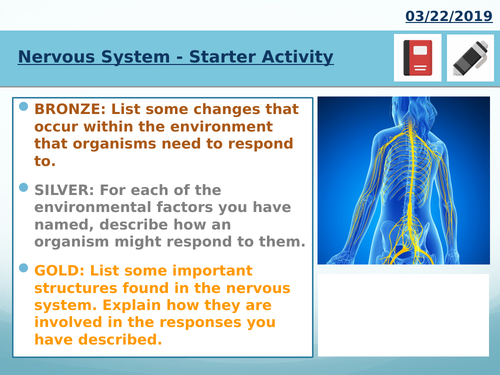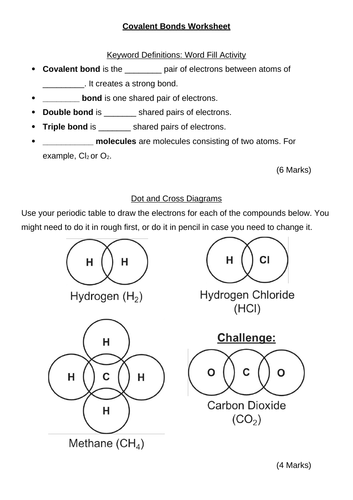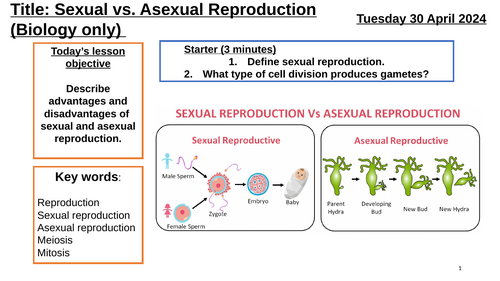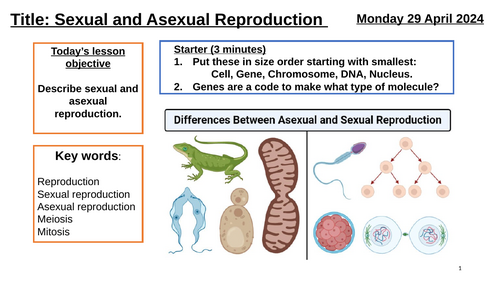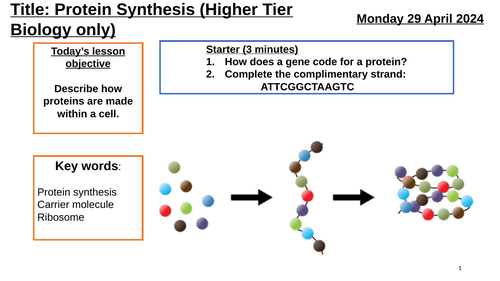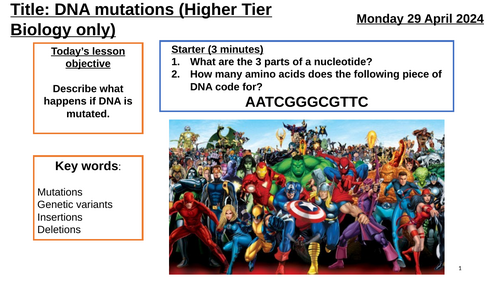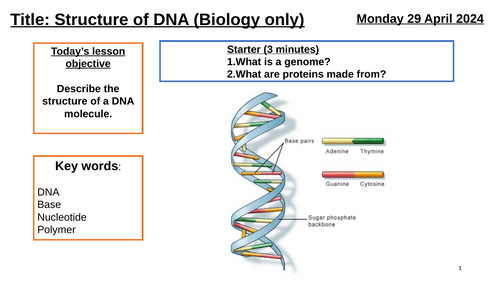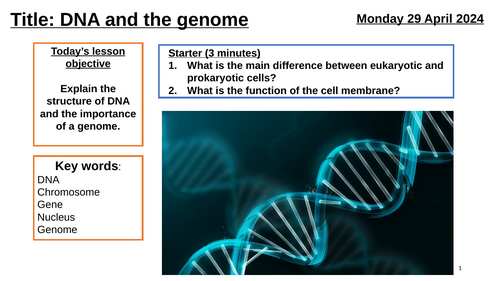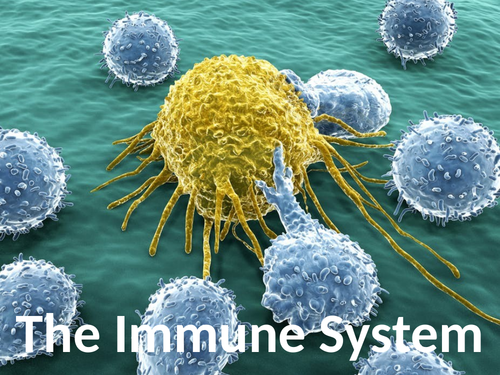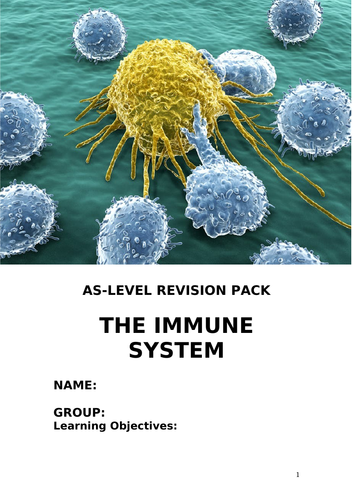63Uploads
16k+Views
13k+Downloads
All resources

Year 8/9 KS3/KS4 Chemistry Combustion Burning Fuels Full Lesson
Full KS3 (Year 8) lesson on combustion, including differentiated starter and plenary.
Covers the following LOs…
LO) To describe the differences between complete and incomplete combustion.
State the products of complete and incomplete combustion.
Describe the problems associated with the products of incomplete combustion.
Construct word and symbol equations for the complete combustion of simple hydrocarbons.

AS/A2-Level AQA Biology Photosynthetic Pigments and Chromatography Full Lesson
A full lesson on Photosynthetic Pigments and Chromatography, covering the following LOs…
State the precise location of the pigments involved in photosynthesis within the leaf.
Outline the role of the leaf pigments in photosynthesis.
Explain why many plants have a variety of photosynthetic pigments.
Describe how to investigate photosynthetic pigments using chromatography.
Lesson includes starter task, two sets of practice exam questions (and mark schemes), practical questions, and student sheet for Required Practical 7 - Use of chromatography to investigate the pigments isolated from leaves of different plants.

AS/A2-Level AQA Biology Testing for Carbohydrates Iodine Test Benedict's Test Full Lesson
A full lesson on Testing for Carbohydrates, covering the following LOs…
Describe the test for reducing and non-reducing sugars.
Explain when the Benedict’s test can be described as both qualitative, semi-quantitative and quantitative.
Analyse results obtained from the Benedict’s test.
Lesson includes starter task, summary questions (with answers), and practice questions (with mark scheme).

AS/A2-Level AQA Biology RP6 Investigating Selection Aseptic Technique Antibiotics Bacterial Growth
A PowerPoint on “Investigating Selection” to accompany the Required Practical on Antibiotics & Bacterial Growth (Aseptic Technique), covering the following LO…
Be able to use aseptic techniques to investigate the effect of antimicrobial substances on microbial growth (RP6).
Lesson includes starter task, plenary, home learning task (practice exam questions and mark scheme), and also a student practical sheet (with equipment list, risk assessment, method, extension questions, and teacher marking criteria).
Please check out my other AS/A-Level AQA Biology resources for this topic :)

GCSE 9-1 Science Biology Nervous System Neurone Voluntary Involuntary Actions Reflex Arc Full Lesson
Full lesson on voluntary vs involuntary reactions, 3 different types of neurones (sensory, relay and motor), and reflex arcs.

AS/A2-Level AQA Biology Phagocytosis Phagocyte Non-Specific Immune System Full Lesson
A full lesson on Phagocytosis, covering the following LOs…
Describe the process of phagocytosis.
Explain the role of lysozymes in the destruction of pathogens.
Explain the role of antigen presentation following destruction.
Lesson includes starter task, application questions (with answers), and practice exam questions (and mark scheme).

KS4 GCSE 9-1 Science Chemistry Covalent Bonds Bonding Worksheet
A worksheet about covalent bonds, with word fill and dot-cross diagram activities.

KS3 (Year 7, 8, and 9) Biology Science Biochemical Food Tests Detective Bingo Starter Activity
KS3 Food Detective (Food Tests) Bingo Lesson Starter Activity
Contains class instructions, calling card statements, and 15x bingo cards.
Perfect for a class of approx. 30 students to work in groups of 2 or 3.
Great for recapping/revising the tests for proteins (Biuret solution), fats (ethanol solution), sugars (Benedict’s solution), and starch (Iodine solution).

Editable Teacher Timetable Boho Rainbow Dalmatian Spot
Editable Teacher Timetable Boho Rainbow Dalmatian Spot.

AQA GCSE Biology Lesson 6- Asexual Sexual Reproduction BIO ONLY (Inheritance Variation & Evolution)
AQA GCSE Biology Lesson 6 - Asexual vs. Sexual Reproduction BIO ONLY (Inheritance, Variation & Evolution Topic)
A full lesson with worksheets (and answers) all about Asexual vs. Sexual Reproduction.
The lesson contains…
Starter activity
Application questions
Exam questions
Plenary activity
Please note that this lesson is for Triple Biology students only.
Please check out my other resources for this topic :)

AQA GCSE Biology "Lesson 5 - Sexual Asexual Reproduction (Inheritance, Variation & Evolution Topic)
AQA GCSE Biology "Lesson 5 - Sexual and Asexual Reproduction (Inheritance, Variation and Evolution Topic)
A full lesson (with answers) all about sexual and asexual reproduction.
The lesson contains…
Starter activity
Application tasks
Quick Check Questions
Plenary activity
Please check out my other resources for this topic :)

AQA GCSE Biology "Lesson 3-Protein Synthesis" BIO HT ONLY (Inheritance, Variation & Evolution Topic)
AQA GCSE Biology “Lesson 3-Protein Synthesis” BIO HT ONLY (Inheritance, Variation & Evolution Topic)
A full lesson with worksheets (and answers) all about the protein synthesis.
The lesson contains…
Starter activity
Application tasks
Quick check questions
Plenary activity
Please note that this lesson is for Triple Higher Tier Biology students only.
Please check out my other resources for this topic :)

AQA GCSE Biology "Lesson 4 - DNA Mutations" BIO HT ONLY (Inheritance, Variation & Evolution Topic)
AQA GCSE Biology “Lesson 4 - DNA Mutations” BIO HT ONLY (Inheritance, Variation & Evolution Topic)
A full lesson with worksheets (and answers) all about DNA mutations.
The lesson contains…
Starter activity
Application tasks
Exam questions
Plenary activity
Please note that this lesson is for Triple Higher Tier Biology students only.
Please check out my other resources for this topic :)

AQA GCSE Biology "Lesson 2 - Structure of DNA" BIO ONLY (Inheritance, Variation and Evolution Topic)
AQA GCSE Biology “Lesson 2 - Structure of DNA” BIO ONLY (Inheritance, Variation and Evolution Topic)
A full lesson with worksheets (and answers) all about the structure of DNA.
The lesson contains…
Starter activity
Application tasks
Exam questions
Plenary activity
Please note that this lesson is for Triple Biology students only.
Please check out my other resources for this topic :)

AQA GCSE Biology "Lesson 1 - DNA and The Genome" (Inheritance, Variation and Evolution Topic)
AQA GCSE Biology “Lesson 1 - DNA and The Genome” (Inheritance, Variation and Evolution Topic)
A full lesson with worksheets (and answers) all about DNA and the Genome.
The lesson contains…
Starter activity
Application tasks
Exam questions
Plenary activity
Please check out my other resources for this topic :)

AS/A2 Level Year 12/13 Immune System Immunity Full Lesson Presentation
Presentation covering the following information…
LO1) Describe the physical and chemical (non-specific) defences against pathogens in animals, including the skin, blood clotting, wound repair, inflammation, expulsive reflexes and mucous membranes.
LO2) Describe the structure and mode of action of phagocytes in the non-specific (innate) immune response, including neutrophils and antigen-presenting cells and the roles of cytokines, opsonins, phagosomes and lysosomes.
LO3) Describe the structure, different roles and modes of action of T lymphocytes in the specific (adaptive) immune response, including clonal selection and clonal expansion, T helper cells, T killer cells, T regulatory cells and memory cells.
LO4) Describe the structure, different roles and modes of action of B lymphocytes in the specific (adaptive) immune response, including plasma cells and memory cells.
LO5) Explain the significance of cell signaling, with reference to interleukins.
To accompany my “AS Immune System” Student Revision Booklet Pack (see other resources).

AS/A2 Level Year 12/13 Immune System Immunity Revision Booklet Pack
Revision pack for students to fill out (including exam tips and practice questions), covering the following topics on the immune system…
LO1) Describe the physical and chemical (non-specific) defences against pathogens in animals, including the skin, blood clotting, wound repair, inflammation, expulsive reflexes and mucous membranes.
LO2) Describe the structure and mode of action of phagocytes in the non-specific (innate) immune response, including neutrophils and antigen-presenting cells and the roles of cytokines, opsonins, phagosomes and lysosomes.
LO3) Describe the structure, different roles and modes of action of T lymphocytes in the specific (adaptive) immune response, including clonal selection and clonal expansion, T helper cells, T killer cells, T regulatory cells and memory cells.
LO4) Describe the structure, different roles and modes of action of B lymphocytes in the specific (adaptive) immune response, including plasma cells and memory cells.
LO5) Explain the significance of cell signaling, with reference to interleukins.
LO6) Examine and draw cells observed in blood smears.
LO7) Describe the structure and functions of antibodies.
LO8) Describe the actions of agglutinins and anti-toxins.
LO9) Describe the difference between primary and secondary immune responses, including the roles of T memory and B memory cells.
LO10) Describe the differences between active and passive immunity, and between natural and artificial immunity, and state examples of each.
LO11) Describe what autoimmunity is, and give examples.
LO12) Explain the main principles of vaccination and the role of vaccination programmes in the prevention of epidemics.

iGCSE Science: Reliability, Accuracy, and Validity Lesson Pack - Evaluating Experimental Data
iGCSE Science: Reliability, Accuracy, and Validity Lesson Pack- Evaluating Experimental Data
Lesson pack designed to help students understand the difference between reliability, accuracy and validity when evaluating experimental data.
Created for iGCSE, but can be easily adapted to suit other exam boards.
Lesson consists of…
Differentiated learning objectives.
RAG starter questions with extension activity, key word handouts, and answers.
Accurate vs. reliable dartboard activity with worksheets.
BIG PHARMA Bingo activity, with bingo statements and 15 bingo cards.
“Would I lie to you?” plenary.
Works really well for Year 9, 10 or 11.

KS3/KS4 Chemistry Science Balancing Equations Bronze/Silver/Gold Worksheets (& Presentation)
Bronze (low ability), silver (medium ability), and gold (high ability) graded worksheets on balancing chemical equations. Students can start on bronze-level and work their way up to gold. Helps you to easily differentiate within the classroom. Useful for KS3, KS4, and all sciences.
Also contains a PowerPoint presentation with 3 examples to run through first! :)

KS3 Year 8 Biology Science Aerobic Respiration Full Lesson
Full Year 8 science (biology) lesson on aerobic respiration, containing…
Starter activity: bronze, silver and gold level (plus extra challenge).
What is aerobic respiration?
How are the reactants/products of respiration transported around the body?
Quick check: TRUE or FALSE questions.
Why do we need energy?
Comparison of aerobic respiration to breathing, combustion, and anaerobic respiration.
Quick check: Word Match activity.

